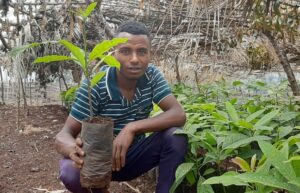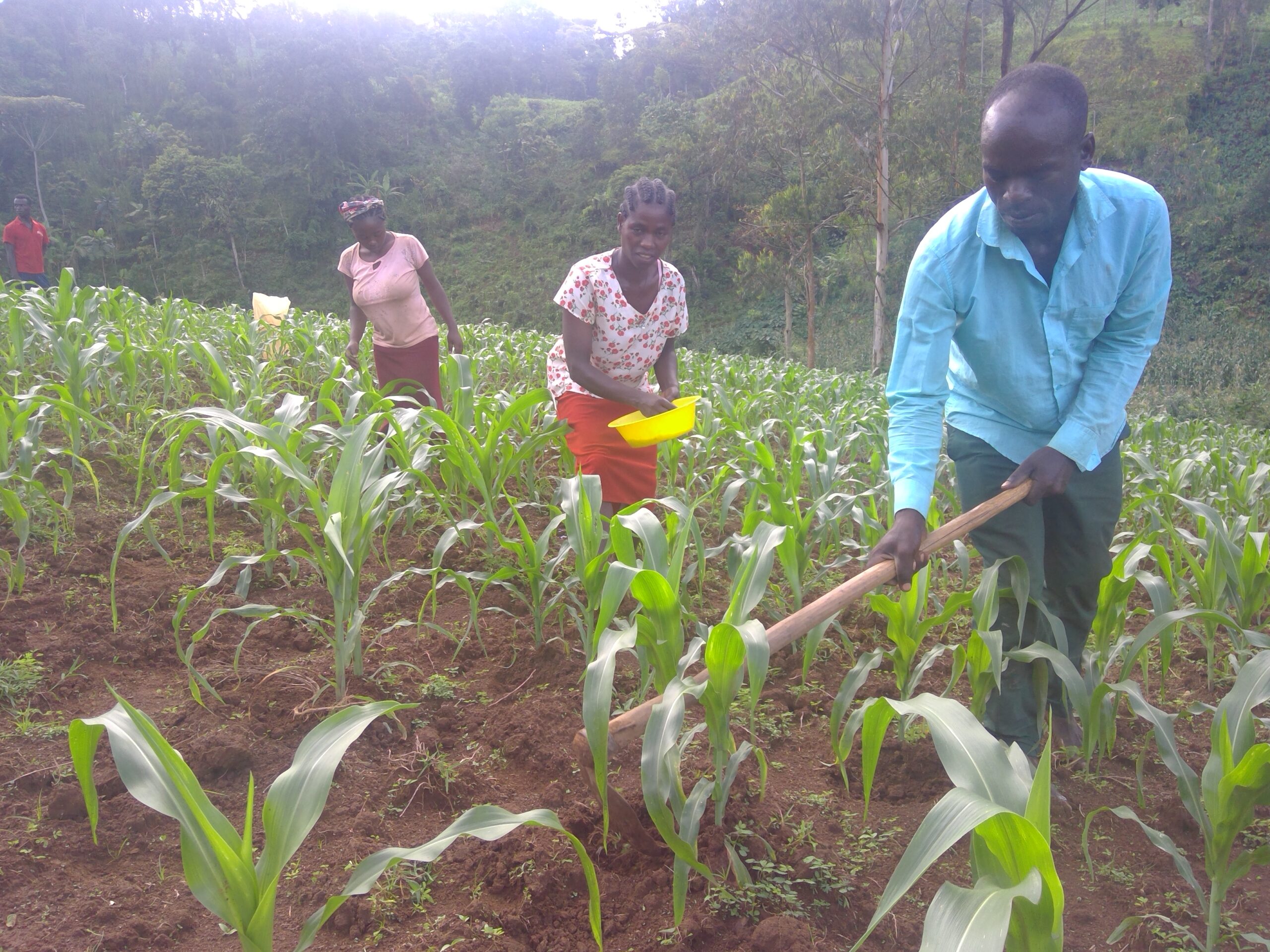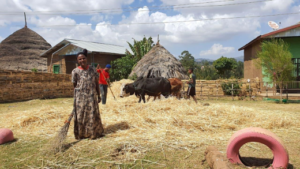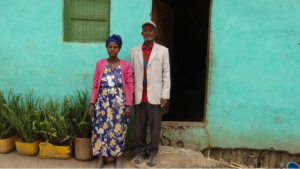 International Youth Day 2022 focuses on creating a world for all ages. Young people continue facing age-related barriers in many spheres of life, including employment. Over the last two years, Digital Green, in collaboration with Environment and Coffee Forest Forum (ECFF), has empowered youth in the Jimma Zone Gera and Shebe Sombo districts of Ethiopia as part of the Advancing Conservation, Agriculture and Livelihoods in Oromia project generously funded by the David and Lucile Packard Foundation. Through this project, Digital Green has helped 170 youth (40% women) form 10 youth-led enterprises that contribute to job creation and economic opportunities for youth while reducing deforestation and forest degradation, supporting biodiversity, and adapting and mitigating the effects of climate change. The members of the youth-led enterprises have been trained on business skills, sustainable forest-based livelihood activities, and nursery site management. As a group, they have been provided with seed capital to jump start the enterprises and land for nursery and/or seedling production.
International Youth Day 2022 focuses on creating a world for all ages. Young people continue facing age-related barriers in many spheres of life, including employment. Over the last two years, Digital Green, in collaboration with Environment and Coffee Forest Forum (ECFF), has empowered youth in the Jimma Zone Gera and Shebe Sombo districts of Ethiopia as part of the Advancing Conservation, Agriculture and Livelihoods in Oromia project generously funded by the David and Lucile Packard Foundation. Through this project, Digital Green has helped 170 youth (40% women) form 10 youth-led enterprises that contribute to job creation and economic opportunities for youth while reducing deforestation and forest degradation, supporting biodiversity, and adapting and mitigating the effects of climate change. The members of the youth-led enterprises have been trained on business skills, sustainable forest-based livelihood activities, and nursery site management. As a group, they have been provided with seed capital to jump start the enterprises and land for nursery and/or seedling production.
The Bedadina Dema youth-led enterprise is among those enterprises established by the project, with a total of 16 members (eight male and eight female members) ages 15 to 29. Many of the members had to drop out of school because their families were unable to cover the expenses associated with their schooling. The Bedadina Dema youth-led enterprise established a nursery and is currently involved in forest and fruit seedling cultivation. Ahmadin Yazid (pictured above) is a member and leader of the group. He said he is looking forward to selling at the local market the 4,000 avocado, 32,000 coffee, and 447,550 exotics and indigenous forest seedlings they have produced.
Rijal Abatemam used to be an unemployed youth with limited economic opportunities. Now, as a member of the Bikiltu youth-led enterprise, he supports the group in maintaining 17 coffee seed beds with 3,000 coffee plants. In addition to planting seedlings, he is also engaged in beekeeping as part of the enterprise. Rijal calls upon other youth to be part of such groups and independently create job opportunities for other youth in their community.
Digital Green believes in the importance of engaging youth in actions to preserve and enhance the environment, which has a direct impact on their views, behaviors, and livelihoods, as well as on their families and their community.

 struggled to apply what he had learned, as he is a native speaker of Bench,
struggled to apply what he had learned, as he is a native speaker of Bench,  ikish Bogale lives in Hadiya Zone Lemo Woreda. After her husband passed away, her life changed drastically. Before, she dedicated her time to the household and her six children while her husband managed their one hectare farm, growing bean, wheat, barley, and maize. Her husband used to be an active member of a development group in the area, but Sinafikish had not been involved. After her husband’s passing, Sinafikish began taking a more active role in the farm. She said, “I decided to engage myself in farming. I started communicating with the development agents of my village and actively started attending video dissemination sessions. Even if I did not have prior knowledge and practice of how to prepare land, sowing, harvesting, I have gotten practical knowledge about wheat growing from the video dissemination sessions that I have attended in women development groups.”
ikish Bogale lives in Hadiya Zone Lemo Woreda. After her husband passed away, her life changed drastically. Before, she dedicated her time to the household and her six children while her husband managed their one hectare farm, growing bean, wheat, barley, and maize. Her husband used to be an active member of a development group in the area, but Sinafikish had not been involved. After her husband’s passing, Sinafikish began taking a more active role in the farm. She said, “I decided to engage myself in farming. I started communicating with the development agents of my village and actively started attending video dissemination sessions. Even if I did not have prior knowledge and practice of how to prepare land, sowing, harvesting, I have gotten practical knowledge about wheat growing from the video dissemination sessions that I have attended in women development groups.” Back in 2019, Ermisa Dindo, a resident of Damboya woreda, used to think of a video-based extension was a waste of time. But he gave it a chance, and now Ermisa is an active attendee of video dissemination sessions. He adopts each practice to the extent possible. Ermisa explains, “I started to practice Teff and wheat row planting after watching the videos. Adopting these practices saved the seed rates and the fertilizer amount per hectare, and there is also a yield difference in the produces. I would also like to diversify my income through cattle farming by improving and crossbreeding local cattle as well as producing vegetable crops.”
Back in 2019, Ermisa Dindo, a resident of Damboya woreda, used to think of a video-based extension was a waste of time. But he gave it a chance, and now Ermisa is an active attendee of video dissemination sessions. He adopts each practice to the extent possible. Ermisa explains, “I started to practice Teff and wheat row planting after watching the videos. Adopting these practices saved the seed rates and the fertilizer amount per hectare, and there is also a yield difference in the produces. I would also like to diversify my income through cattle farming by improving and crossbreeding local cattle as well as producing vegetable crops.”